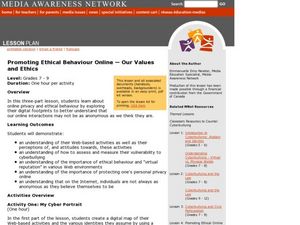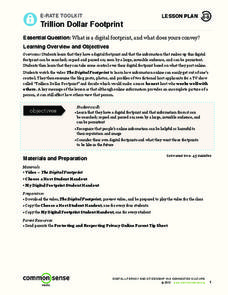Nemours KidsHealth
Online Safety: Grades 9-12
Teach teens how to protect themselves from hackers, scammers, and online predators. First, class members examine their own digital footprints think critically about their online profile. Groups then generate lists of "do" and "don't do"...
Teaching Tolerance
How Online Communication Affects Privacy and Security
Digital footprints leave a lot of clues behind! Pupils discuss the positives and negatives of having a digital footprint and what it means. Then, using a handout, scholars learn ways to protect their online privacy.
Teaching Tolerance
Digital Activism Remixed: Hashtags for Voice, Visibility and Visions of Social Justice
It's time to discover hashtag activism! Using an engaging resource, learners explore viral hashtag campaigns relating to diversity, identity, and justice. Next, they either design their own hashtag campaigns or respond to existing ones.
Curated OER
Citizens of the Future
Young sociologists explore how local, state, and federal governments work. This very impressive and ambitious lesson requires pupils to contact government officials who represent them and their families. They research elections, and hold...
Curated Video
Detecting Lies & Harmful Links
Who and what can you trust online? How do you know? After viewing a pair of introductory videos on positive and safe online conduct, learners discuss the content and put it into practice during an online search activity about alien life.
Curated Video
Online Reputation and Cyber-bullying
Combat cyberbullying with information. During this plan, learners watch a couple of videos, consider online behavior scenarios, brainstorm long- and short-term consequences, and discuss how to react to bullying in order to build up to...
Curated Video
Privacy Part 2
Why is online privacy so important? Explore privacy with a group assignment for which pupils create word clouds with words they associate with privacy. A discussion and online activity follow. Learners will read articles, explore the...
Curated Video
Reporting - Safety and Abuse Tool
Keep your charges safe online with instruction on how to report problems on YouTube. After providing learners with information on the Safety and Abuse Tool, demonstrate how to use the tool and discuss the feature. In groups, learners...
Curated Video
Reporting - Flagging
While it may feel like you can post just about anything on YouTube, that's not the case. Teach your class about flagging inappropriate content. Learners watch a demonstration, practice flagging, and answer questions about online content.
Curated OER
Digital Values: Internet Safety
Students explore digital communication by participating in a critical thinking activity. For this Internet safety lesson, students discuss ways to protect their identity on the Internet as well as preserving friendships. Students...
Anti-Defamation League
Building a Foundation for Safe and Kind Online Communication
Put a spotlight on internet safety with a lesson designed to boost positive online communication. Scholars listen to the story, Yettele's Feathers by Joan Rothenberg, and answer questions. An emoji-themed handout challenges pupils to...
Facebook
Introduction to Privacy
Sharing may be caring, but how much is too much? Young digital citizens ponder personal information during a activity from a module about privacy and reputation. Individuals take a survey, then mingle with classmates in a privacy game...
Facebook
Public Wi-Fi
Sometimes free Wi-Fi comes with a hefty price tag! Networking novices examine the components of a Wi-Fi network during a digital citizenship lesson from an extensive series. Groups work together to map out a day's worth of Internet...
Facebook
Cybersecurity, Phishing, and Spam
Take a serious look at an equally serious topic! Security scholars explore and discuss the methods hackers use to gain access to personal information during a well-written digital citizenship activity. Part of an extensive series, the...
Facebook
Who Do You Want to Be?
Can posting art or music online lead to the career of your dreams? Inquisitive individuals consider their social media presence with a lesson from a series focusing on identity exploration and digital citizenship. Pairs put their heads...
Curated OER
What is a Computer Crime?
An important lesson on cybercrimes is here for you. In it, young computer users learn about how people commit crimes on computers by hacking into accounts, and stealing personal information from people. Some excellent discussion...
Facing History and Ourselves
Citizen Watchdogs and the News
To conclude their case study of media coverage of the shooting of Michael Brown by a Ferguson, Missouri, police officer, class members consider the role of citizen watchdogs in a democratic society, develop strategies for combating...
Curated OER
Netiquette Etiquette
Pupils use the Internet to locate, read and comprehend information the Internet's code of etiquette. They create a slideshow or poster, or apply their knowledge by corresponding to an online pen pal.
Teaching Tolerance
Privacy and Security Online
Don't forget to dust for digital footprints! Scholars engage in a whole-class discussion about how digital footprints compromise online safety and privacy. Next, small groups create posters to illustrate what it looks like to follow...
Health Smart Virginia
Social Networking and You
The positive and negative impacts of social networking are the focus of a powerful instructional activity for high school freshmen. Class members explore the risks of oversharing online and watch a video of one girl's experience. The...
Curated OER
Promoting Ethical Behaviour Online — Our Values and Ethics
Students explore Internet safety practices. In this online privacy instructional activity, students examine their digital footprints in order to assess their online privacy and ethics.
Common Sense Media
Trillion Dollar Footprint
Learners explore their digital footprints, and discover how information they put online can easily be searched, copied, forwarded, and seen by a large audience.
Common Sense Media
Going Places Safely
How can places on the Internet be dangerous? Youngsters draw important connections between traveling online and staying safe in the real world. They also discover three key online safety rules to guide them throughout their online...
Common Sense Media
Which Me Should I Be?
Impress upon learners the importance of considering how we identify ourselves online, and how this relates to overall considerations of safety and digital wellness.

























